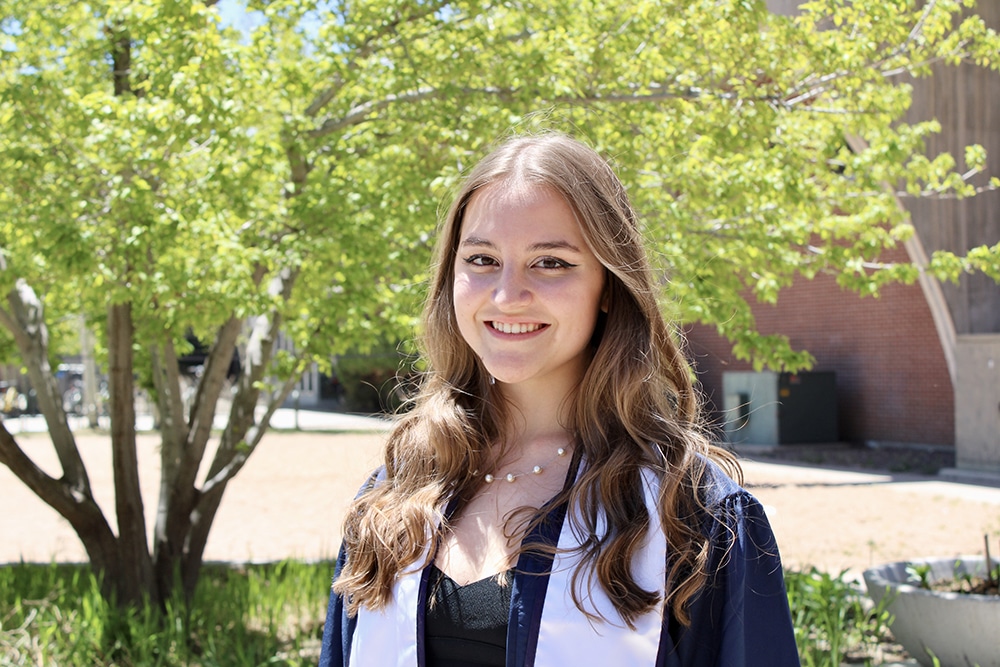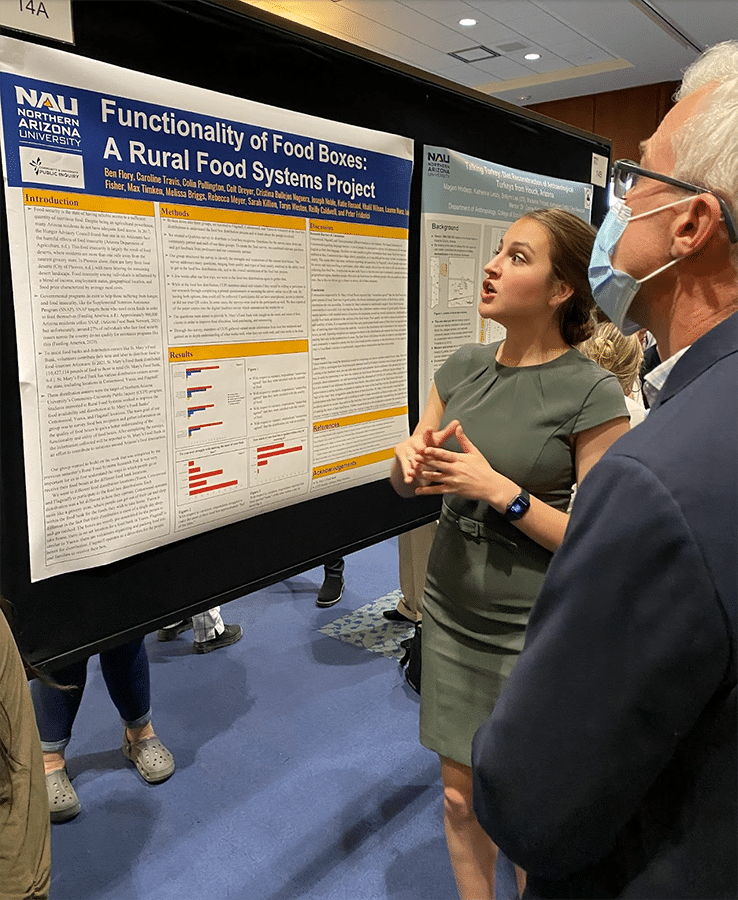When Melissa Briggs writes her personal statement for her applications to medical school, she’ll have a few topics to consider.
She could write about her undergrad research studying rural food deserts and the unique needs of the people who live in them and the lesson she took away from that work—that there is not a one-size-fits-all solution to most health concerns and a good doctor will need to spend time gathering information and tailoring solutions for the individual sitting in front of her.
Or she could write about her internship in the medical examiner’s office assisting with autopsies and how this helped motivate her to become a physician so she could help save lives but also taught her the importance of having empathy and respect for every person, even those who have already died.
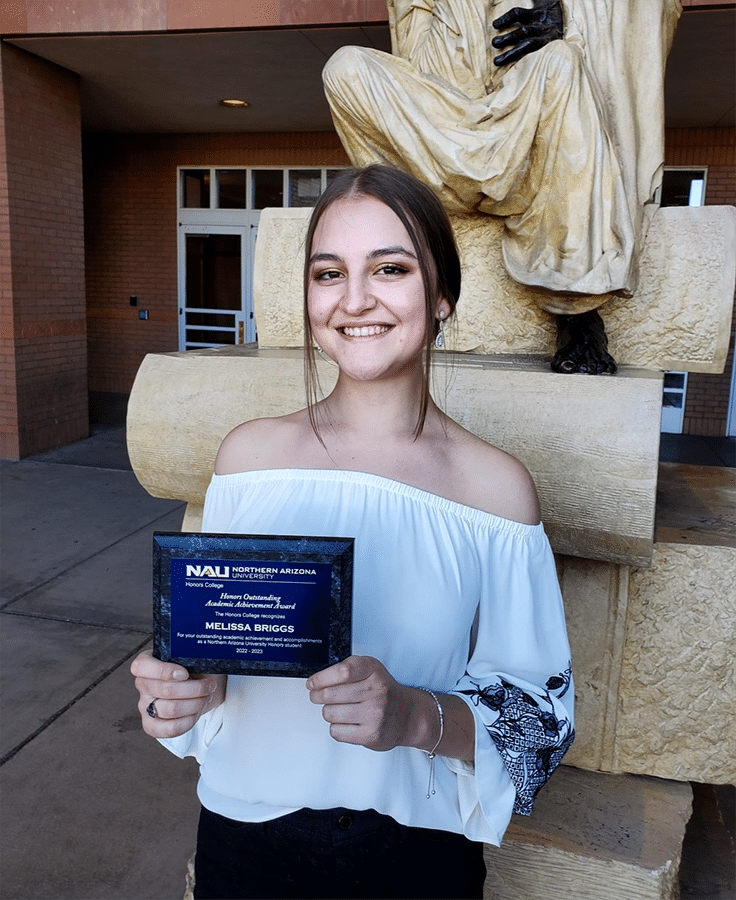
Briggs has a lot of things to do after she graduates from NAU this weekend—studying for the MCAT. Applying to med school. Going to Laos for a month with the GIVE Program. Continuing her internship with the Coconino County Office of the Medical Examiner. Volunteering for a local hospice. Being a TA for a Gross Anatomy course at NAU. Being a TA (pending) for the University of Colorado School of Medicine’s Wilderness First Responder program. It’s all building on the person she’s become while at NAU.
“At the end of each year, I have been able to look back at where I started and see how much I have changed,” she said. “Each year I step a little further from my 18-year-old self, and each year I feel a little prouder than I did before. One of my favorite things about my time as an undergraduate student was the opportunity to let my ambitions and curiosity run wild. My eagerness to learn and grow never went unrewarded! I am so, so excited about everything that lies ahead of me.”
Undergraduate research with CUPI 
Because of her interest in medicine, Briggs initially looked at research in NAU’s cardiology lab, but it wasn’t quite what she wanted to do. She learned about the Community-University Public Inquiry (CUPI) program, which offered hands-on, community-oriented opportunities for research. She joined the Rural Food Systems pod, which was working with communities that didn’t have readily accessible sources of nutrition, so they depended on food banks in their area.
The Rural Food Systems pod conducted research on the effectiveness of the food boxes that St. Mary’s Food Bank was supplying communities. Briggs and her team went to Yuma, Kingman, Yucca, Page and Chinle and volunteered at food drives, interviewed volunteers and food bank representatives and surveyed the recipients of food boxes. She also worked to create stronger connections between food banks and local farms, which would mean greater access to fresh produce.
The pod aimed to build relationships with communities and learn about the experiences of people who received food boxes. She learned so much about the complexity that is human health through that experience; so often, eating well and exercising is the go-to answer for health issues, especially for those with obesity, diabetes, chronic inflammation and others. But “eat healthy” is much harder—sometimes impossible—when there are no grocery stores, so a food bank is the primary source of food.
“Despite being born and raised in Arizona, I had never before felt more connected with the other communities in the state or seen so much of the beautiful land and cultures until I joined this program,” Briggs said. “There is something deeply meaningful about connecting with and serving the community that deeply resonated with me. I had not recognized the deep prevalence of food deserts throughout Arizona, let alone the entire nation, and it gave me new insight into the barriers people face when obtaining nutritious food for themselves and their families.”
This work also gave her a desire to continue working in rural areas, which both in Arizona and nationwide are experiencing critical health care shortages. She and the rest of her interdisciplinary team, presented their work at the 2022 Undergrad Symposium.
Interning at the ME’s office
Briggs applied for this internship after taking a Gross Anatomy course, and she was excited to put what she’d learned in class to use. But it wasn’t easy. Assisting with autopsies is a challenging assignment that can be grim; she’s witnessed firsthand the deadly effects of trauma, sepsis, illness, decay and more. It’s made her even more sure she wants to be a doctor and also helped prepare her for the knowledge that she won’t be able to save every patient.
In fact, what she’s faced with every day at work is that there is nothing left to be done for the person’s life; nothing she does will change their outcome. One of the soberest reminders of the limitations of medicine is when she sees a pacemaker or some other medical device designed to save people’s lives that ultimately failed.
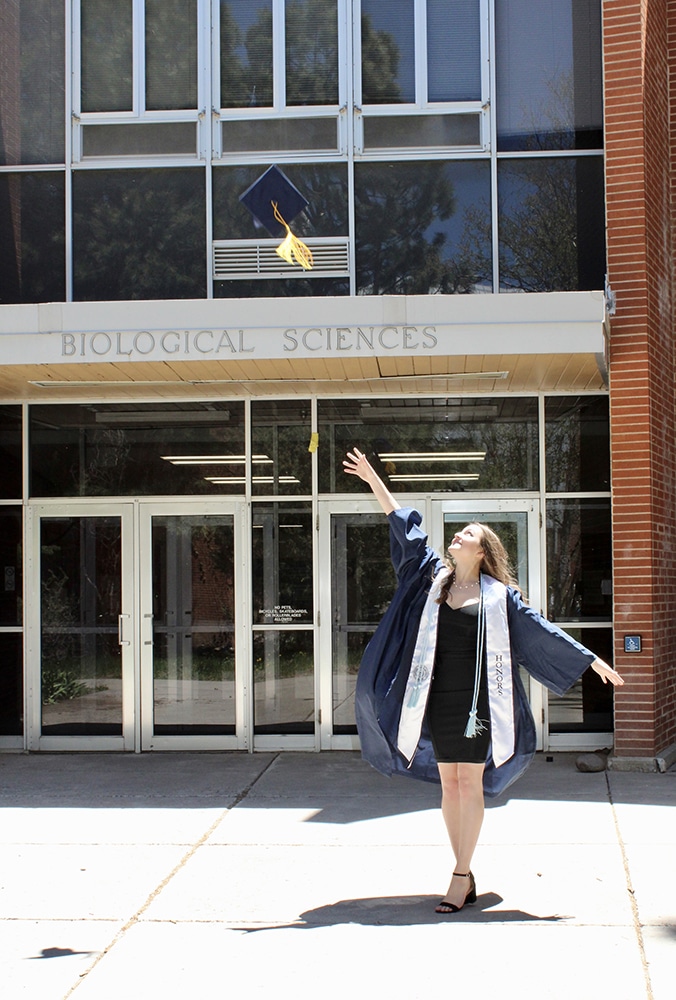
“This position, more than anything, has highlighted how important it is to me to make a difference in the circumstances of the people I work with,” Briggs said. “I didn’t realize just how much fulfillment I got from ensuring I could have a positive impact on a patient that comes into my care,” she said.
Maisie El-Ters, the lead forensic investigator and internship coordinator for the ME’s office, said Briggs has a passion for learning that influences how she approaches her work; she has demonstrated a commitment to growing as a person and a professional.
“Working with Melissa has given me a new excitement for my work,” she said. “Her continuous curiosity and pure excitement to learn and grow as a professional is contagious.”
Her time at NAU and beyond
Briggs came to NAU from Queen Creek; Flagstaff was close enough to home to see her family regularly and far enough to give her the chance to shed the labels she’d had in high school and start fresh to grow into the person she now is.
To do so, she took on as many opportunities for growth as she could. To help overcome self-doubt, she applied for the Supplemental Instruction (SI) program. She became an SI leader, which required that she tutor students with confidence, demonstrate empathy and interpersonal skills and be a leader. She spent last summer getting certified in a Wilderness First Responder course and studied abroad in Ireland.
Jane Gilbert, assistant manager of the SI program, said Briggs worked with more than 500 students in challenging biology courses and proved herself to be a kind, considerate, caring and professional tutor.
“Melissa is not only committed to her work, but she is warmly committed to the people she serves,” Gilbert said. “She has already proven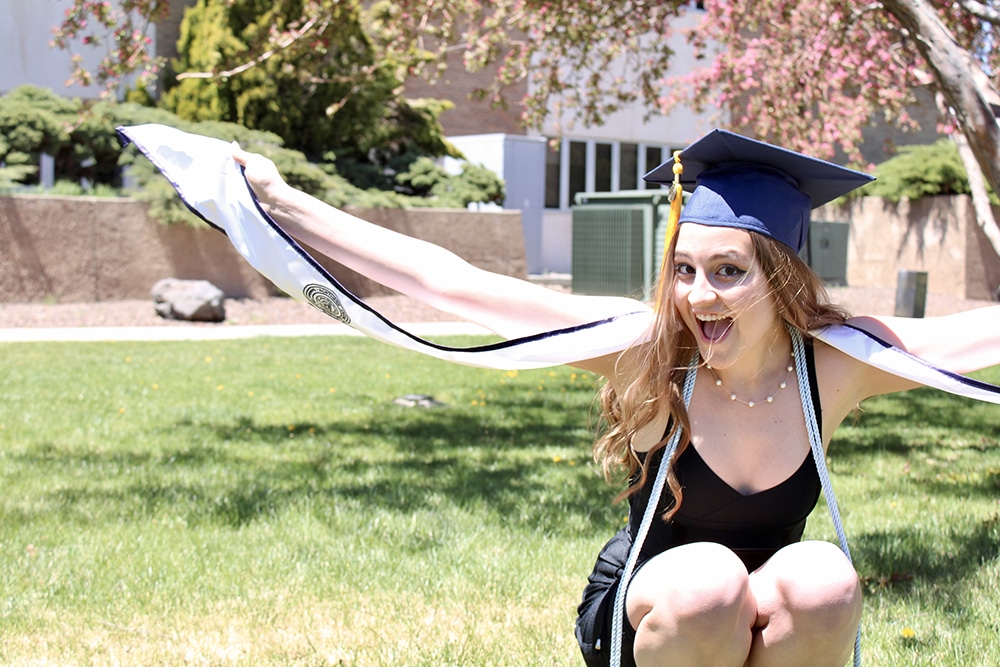
Briggs has worked hard in and out of the classroom to develop the traits she wants to have as a physician—empathy toward her patients, problem-solving and decision-making abilities and a drive to give patients the best quality of care.
“With the help of NAU, I feel empowered and determined to continue advancing throughout my academic career,” she said. “I have developed strong leadership skills, embraced my confidence, and focused my sense of direction. There are many things I could describe as the best part of my time at NAU, but I don’t think there is anything better than seeing the reward of my work and dedication reflected in my confidence, capabilities and character.”
Heidi Toth | NAU Communications
(928) 523-8737 | heidi.toth@nau.edu
